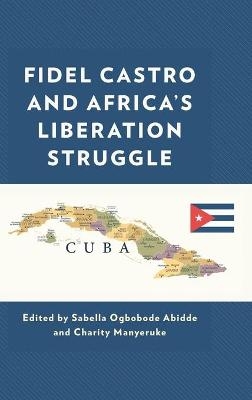
Fidel Castro and Africa’s Liberation Struggle
Lexington Books (Verlag)
978-1-7936-1145-1 (ISBN)
The post-1959 Cuban government’s engagement with Africa, which was led by its charismatic and revolutionary leader, Fidel Castro, had two connecting dimensions: military internationalism and humanitarian internationalism. While African states and societies benefited immensely from these engagements, it was Fidel Castro’s military assistance towards the decolonization of and the pushback of Apartheid South Africa that received the loudest attention and ovation in the developing world. Fidel Castro, this book argues, was never motivated by economic, selfish, or geopolitical considerations; but rather, by the altruism and the certainty of his worldview and by the historical connection between the peoples of Cuba and Africa. The principle of international solidary, socialism, and the emancipation of Africa was a much-desired aspiration and attainment. Beginning covertly in Algeria in 1961 and the Congo and Guinea-Bissau in 1964; and more conspicuously in Angola in 1975, Fidel Castro and his socialist government was at the forefront supporting liberation movements in their struggle against colonialism. Defining Castro’s engagement with Africa was his support for the People’s Movement for the Liberation of Angola (MPLA) against the United States-backed Apartheid South Africa, which supported the National Liberation Front of Angola (FNLA) and the National Union for the Total Independence of Angola (UNITA).
Sabella Ogbobode Abidde is professor of political science at Alabama State University. Charity Manyeruke is the ambassador of Zimbabwe to Rwanda and professor in political science and international relations at the University of Zimbabwe.
Section One: Fidel Castro: The Man, an Era, and his Legacy
Chapter 1: Cuban Internationalism: Fidel Castro’s Motives and Inspiration, Sabella O. Abidde
Chapter 2: Castro and Cabral: Cuban Assistance in the Struggle for Independence of Guinea Bissau and Cabo Verde, Michael R. Hall
Chapter 3: Fidel Castro and the Moment of Change in Africa, Stephen Chan
Chapter 4: Fidel Castro: His Impact on African Liberation and Governance, Priye S. Torulagha
Chapter 5: Fidel Castro’s Traits and US-Cuba Foreign Policy Engagements in Africa, Felix Kumah-Abiwu, James Korku Agbodzakey, and Olusoji Alani Odeyemi
Section Two: Cuban Internationalism, Cost and Consequences
Chapter 6: The Geographic Footprints of Castro’s Cuba in Africa, Augustine Avwunudiogba and Elisha J. Dung
Chapter 7: Beyond Fidel Castro’s Cuba and Zimbabwe’s Bilateral Relations, Charity Manyeruke
Chapter 8: Communism and Revolution in Africa, Musafare Mupanduki
Chapter 9: The Human and Economic Cost of the Liberation Struggle on Cuba, Leonard S Bombom, Elisha J Dung; and Paul Erhunmwunsee
Chapter 10: Promotion of Socioeconomic Human Rights in Africa by Cuba under Fidel Castro: A MultiLevel Analysis, Philip C. Aka
Conclusion: Africa and Cuba in a Post-Castro World
| Erscheinungsdatum | 10.05.2021 |
|---|---|
| Co-Autor | Michael R. Hall, OBE Chan Stephen, Priye S. Torulagha |
| Verlagsort | Lanham, MD |
| Sprache | englisch |
| Maße | 162 x 243 mm |
| Gewicht | 485 g |
| Themenwelt | Geisteswissenschaften ► Geschichte ► Regional- / Ländergeschichte |
| Sozialwissenschaften ► Politik / Verwaltung ► Europäische / Internationale Politik | |
| ISBN-10 | 1-7936-1145-9 / 1793611459 |
| ISBN-13 | 978-1-7936-1145-1 / 9781793611451 |
| Zustand | Neuware |
| Haben Sie eine Frage zum Produkt? |
aus dem Bereich


